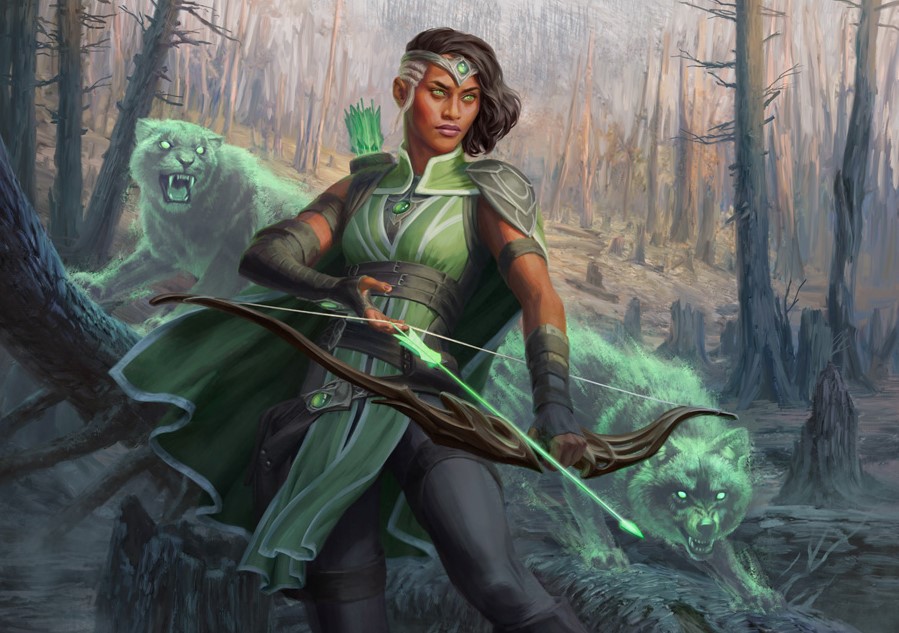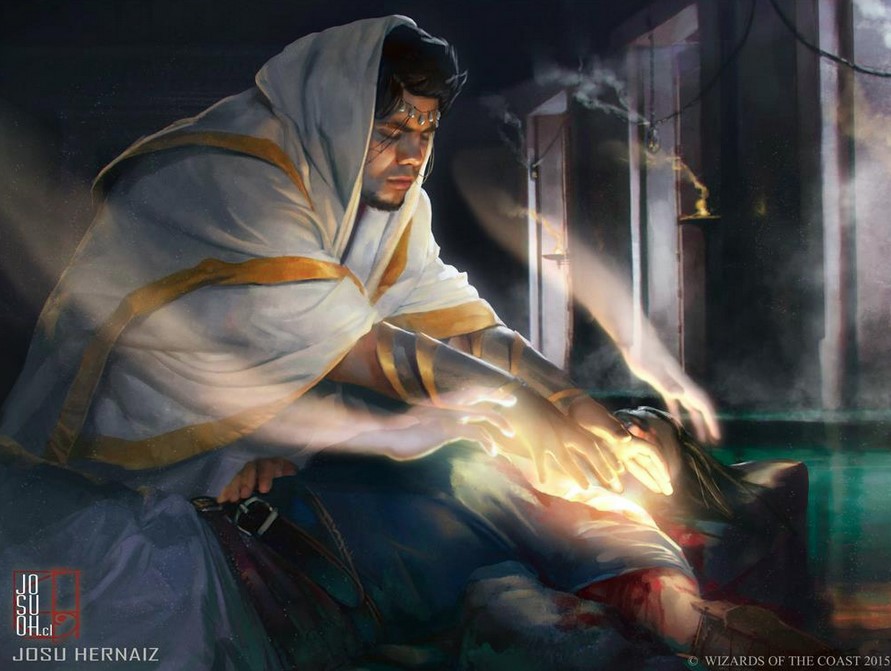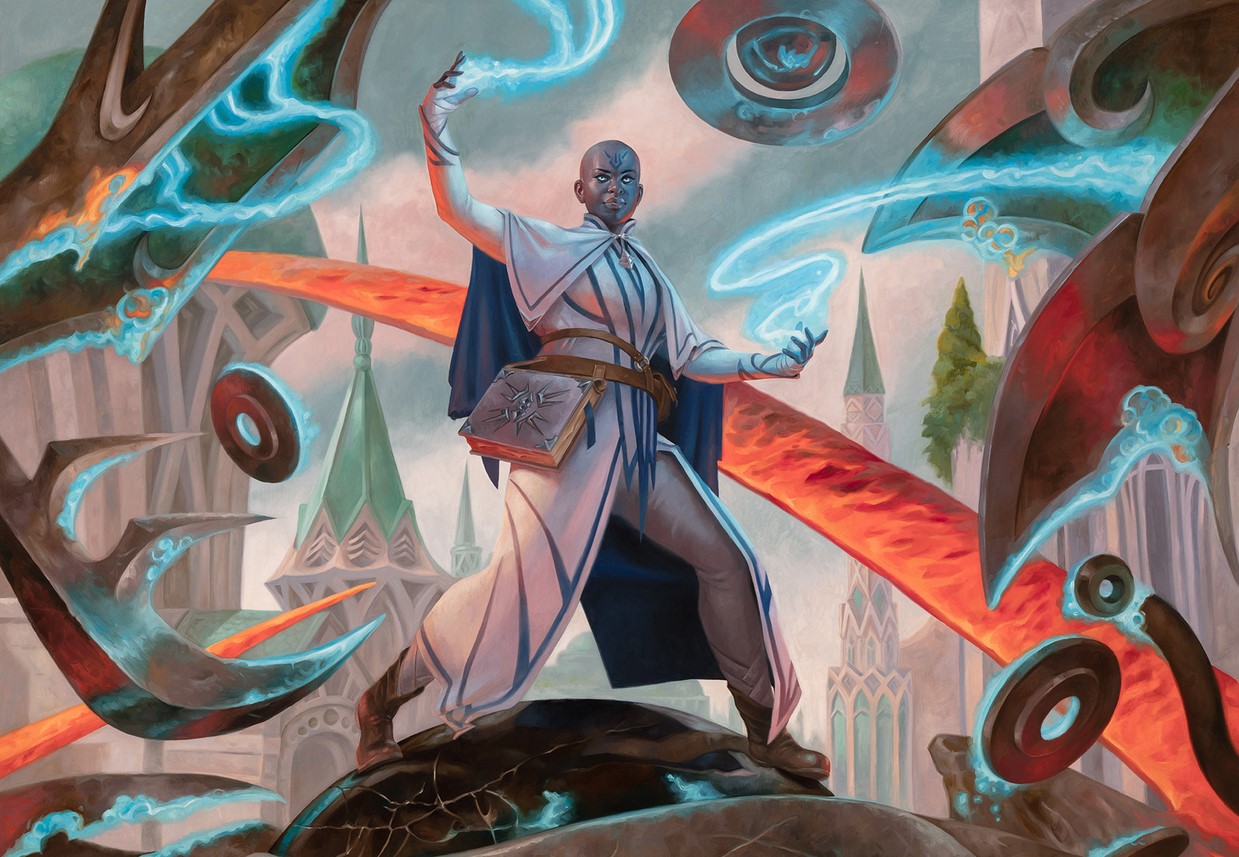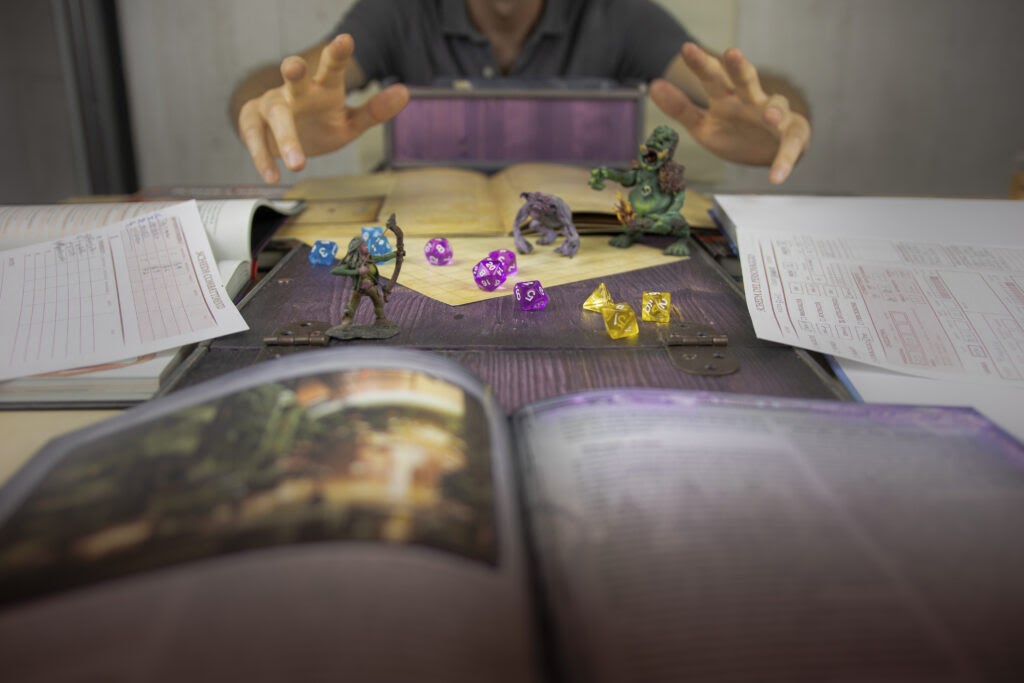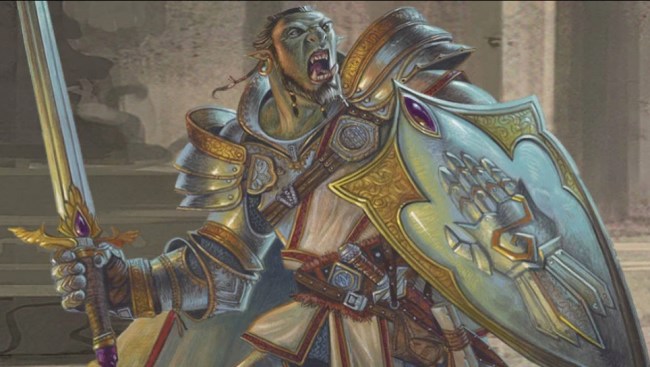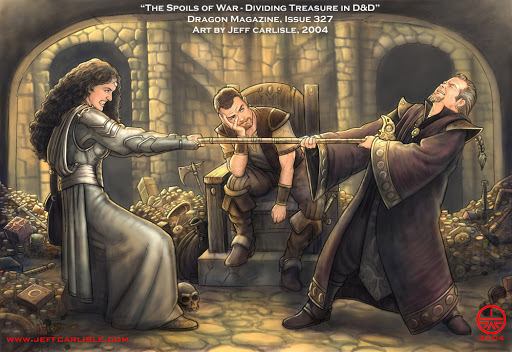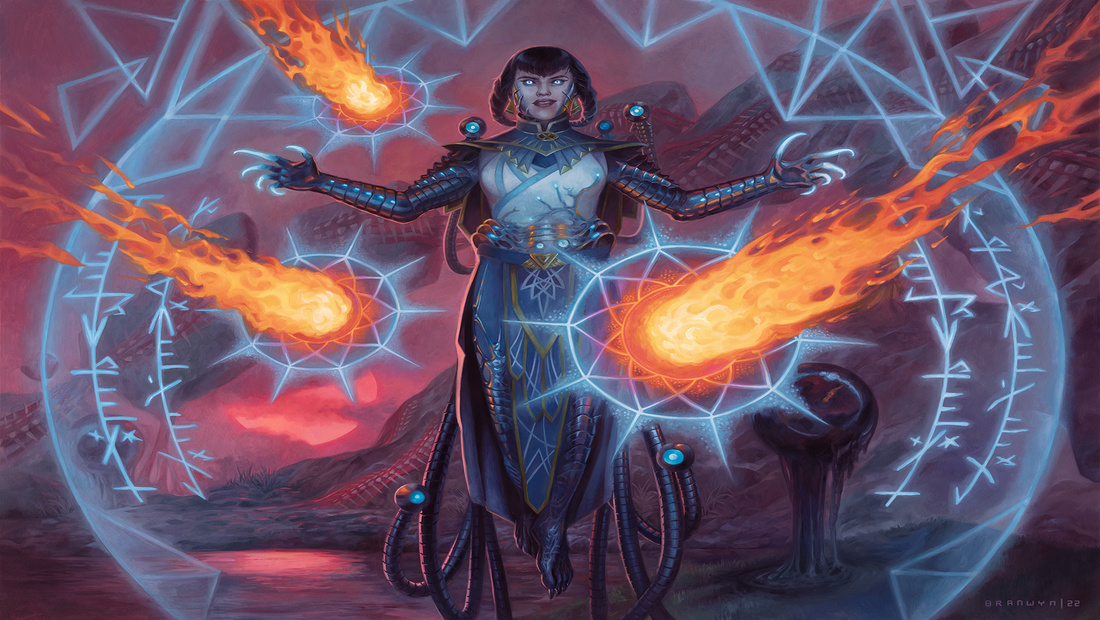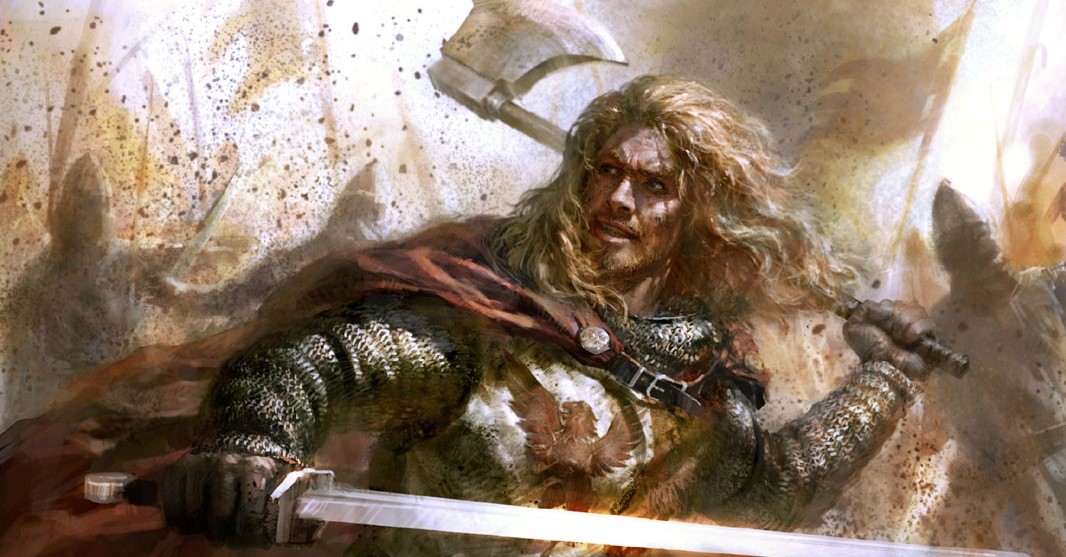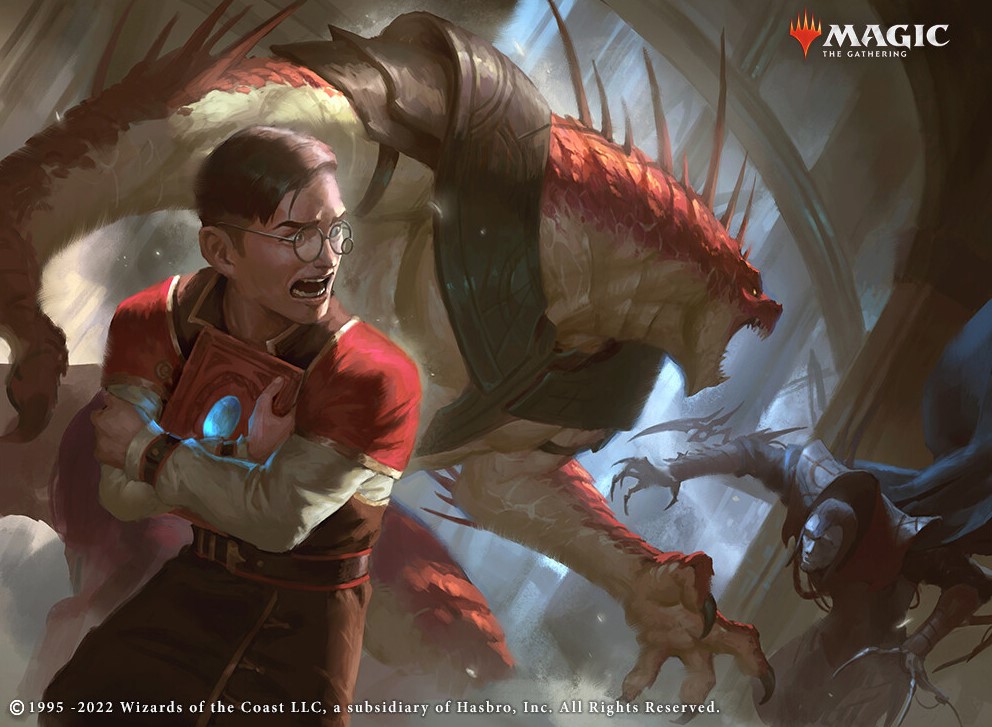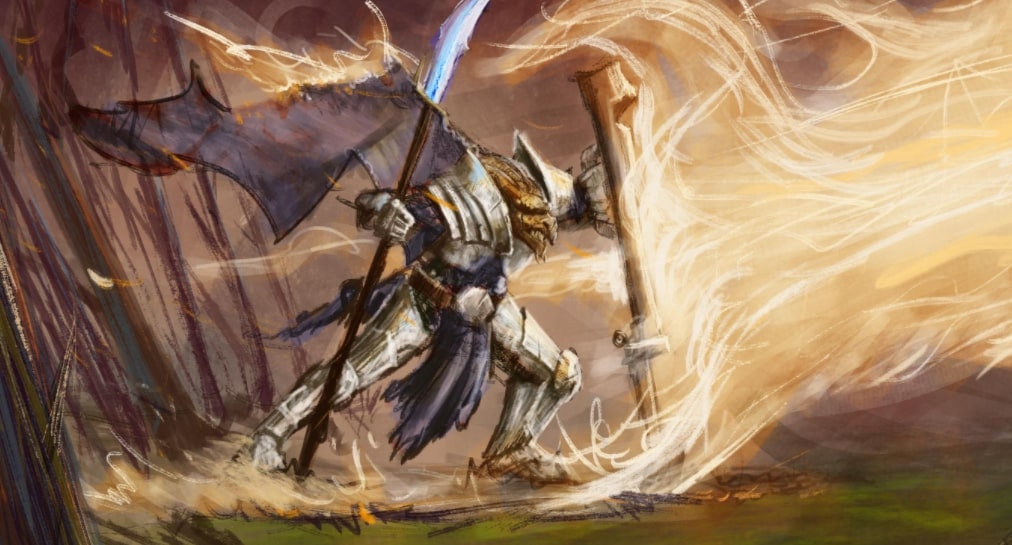
So, you’re playing a cleric, and you’re picking your first feat. Maybe you’ve just reached level 4, or maybe your DM is just being nice. So, which feat to choose? There are so many, and they are all so versatile. Fear not! Here are the top 10 feats for clerics!
10. Mobile

Become Untouchable. Art by Tyler Walpole.
Feat Source: Player's Handbook
- You are exceptionally speedy and agile. You gain the following benefits:
- Your speed increases by 10 feet.
- When you use the Dash action, difficult terrain doesn't cost you extra movement on that turn.
- When you make a melee attack against a creature, you don't provoke opportunity attacks from that creature for the rest of the turn, whether you hit or not.
Clerics are known for being able to play a lot of different roles in a group. Want to heal? Be a life cleric. Want to hurt? Death, War, or Tempest are all great options. Want to control the battlefield? Try Order, or Forge. But no matter what you choose, one thing will almost always be true: You’ll need to be able to move.
The mobile feat makes movement that much easier. That extra 10 feet of movement can literally make a life-or-death difference. Cure wounds - the cleric’s most iconic spell - requires you to touch your downed teammate. If you can’t get to them this turn, they’ll likely have to make a death save before you can do something about it. With a little bit of bad luck, or a particularly brutal enemy, that death save could easily turn into permadeath for a beloved character.
Not to mention the other benefits of this feat. Avoiding opportunity attacks without disengaging is a great option for retreating or repositioning yourself to better serve your fellow players in battle. And ignoring the penalty of difficult terrain can serve the same function. Plus, since you have to dash to ignore the terrain, you’ll move a lot more in one turn than any enemy who’s after you.
Why Mobile Is Great For Cleric
- Extra Movement: Getting across a battlefield to help an ally can be tricky! Extra movement, even 10 feet of it, can consistently make a big difference on your ability to support your friends.
- Dashing to ignore difficult terrain: Position is a big part of combat at most D&D tables. It’s especially important for many cleric spells and roles. This ability can help you get ahead of enemies, or get yourself to the best spot for your next move.
- No opportunity attacks: Even in a support role, you’re most likely going to be doing some actual fighting with the enemy. If you’re needed elsewhere, or you need to retreat, this lets you get away while even getting an extra swipe at your opponent.
9. Inspiring Leader

The best are those who lift up others. Art by Steve Stark.
Source: Player's Handbook
- Prerequisite: Charisma 13 or higher
- You can spend 10 minutes inspiring your companions, shoring up their resolve to fight. When you do so, choose up to six friendly creatures (which can include yourself) within 30 feet of you who can see or hear you and who can understand you. Each creature can gain temporary hit points equal to your level + your Charisma modifier. A creature can't gain temporary hit points from this feat again until it has finished a short or long rest.
We clerics are some of the best supporters in D&D. We’re unmatched as healers, and can provide a wide range of other support options. But sometimes we just want to fight! Or we need to focus on something else in a combat scenario.
Inspiring Leader is a great feat for these situations. If you have the time before combat (and you know a fight is coming), spending 10 minutes to give your allies a little extra health can be a great help.
For you, it frees up a turn or two. This allows you to spend a little more time beating up baddies, or looking for a necessary key or gizmo. For your allies, the little boost can keep them up for an extra turn or two. This gives them that many more attacks. Or spells. Or chances to run away and hide (and then deal some killer sneak attack damage).
The only reason this feat is so low on the list is because it uses CHA for its spellcasting modifier. Typically, clerics need high WIS for spellcasting, and high CON for concentration saves. It can be really tricky to boost three abilities. So, getting CHA to a place where this spell works best usually means giving up on one of the other two abilities. Or keeping WIS and CON up, and so making this a less effective feat - which nobody enjoys.
Why Inspiring Leader Is Great For Cleric
- Relieves you of your healing duties: for at least a little bit, you can breathe easy. Relax! Thanks to this boost, you’re free to do something else for a change.
- Gives your allies more space to do their thing: Even 1 extra HP can be the difference between going unconscious, or getting one more turn in before you need help.
- Gives your whole team an edge on the competition: Give everyone in the party that little boost, that extra time! That’s what we call compound effects. A group’s grit can be the basis of their legendary status (or at least the start of it).
8. Martial Adept

Spells aren't everything. Best to be good at stabbing, too. Art by Milivoj Ćeran.
Source: Player's Handbook
- You have martial training that allows you to perform special combat maneuvers. You gain the following benefits.
- You learn two maneuvers of your choice from among those available to the Battle Master archetype in the fighter class. If a maneuver you use requires your target to make a saving throw to resist the maneuver's effects, the saving throw DC equals 8 + your proficiency bonus + your Strength or Dexterity modifier (your choice).
- You gain one superiority die, which is a d6 (this die is added to any superiority dice you have from another source). This die is used to fuel your maneuvers. A superiority die is expended when you use it. You regain your expended superiority dice when you finish a short or long rest.
Being a cleric is all about assisting the team. This often means healing, casting supportive spells like Bless or Guidance, or (for domains like Order) enabling extra attacks. But you don’t have to rely solely on your class features to help your friends.
This is where the Martial Adept feat comes into play. By learning two maneuvers from the Battle Master subclass of fighter, you can gain some exciting new ways to help out!
A lot of these maneuvers are focused around melee weapon attacks, which you probably won’t be interested in unless you’re a War domain cleric. (If you are a War cleric, then this feat gets even better)! So instead, focus on maneuvers that don’t utilize weapon attacks:
“Rally”, for example, essentially gives you an additional cast of “Healing Word”. You grant a friendly creature who can see or hear you additional temporary hit points.
“Commander’s Strike” allows you to replace one of your attacks with an ally’s attack. Use it to give your party rogue an additional chance at sneak attack, or your monk a chance to stun the enemy out of turn.
“Bait and Switch” allows you to switch places with an ally. You can use this to get in front of them if they’re low on health, or get them closer to the enemy.
“Ambush” allows you to boost a stealth or initiative check. I can’t tell you the number of times I’ve alerted an enemy to my presence from poor stealth checks. As the heavily armored tank, I rolled at disadvantage. Having this extra boost to those rolls would have gone a long way.
Finally, “Evasive Footwork” allows you to boost your AC while moving. This gives you a better chance at getting across the map to a fallen friend.
Why Martial Adept Is Great For Cleric:
- Bolster your friends’ HP: Use Rally to give out an extra heal, no spell slot needed!
- Enable your allies’ superior attacks: Use Commander’s Strike to let a higher-damage-output friend attack instead of you!
- Greater mid-battle maneuverability: Use “Bait and Switch” to trade places with your teammate! Use “Evasive Footwork” to get where you need to go without taking extra damage!
- Be stealthy despite your heavy armor: Use “Ambush” to turn that failed stealth check into a successful one!
7. Drow High Magic

Dark and Mysterious. Art by Anato Finnstark.
Source: Xanathar's Guide to Everything
- Prerequisite: Elf (drow)
- You learn more of the magic typical of dark elves. You learn the Detect Magic spell and can cast it at will, without expending a spell slot. You also learn Levitate and Dispel Magic, each of which you can cast once without expending a spell slot. You regain the ability to cast the spell in this way when you finish a long rest. Charisma is your spellcasting ability for these spells.
As a cleric, you’re expected to be well-versed in divine magic. Part of that well-versed-ness includes the ability to manipulate other people’s magic.
Both Detect Magic and Dispel Magic are already on the Cleric spell list, which is partly why this feat isn’t higher up on this list. However, you still get significant benefits from taking this feat.
For starters, Detect Magic becomes a spell you can cast *at will*. This means you can cast it an unlimited number of times per day! This is huge, especially if you’re in a magic-heavy campaign, or facing a BBEG who loves magical traps.
Secondly, you learn the spell Levitate. This is an incredibly useful utility spell, usually reserved only for sorcerers and wizards. Being able to send yourself or your party members vertically up to 20 feet has a huge number of uses. You can spy on a secret meeting on the second floor of a castle, or get over the walls of a fort. You can anchor a rope swing, or give a friend the perfect vantage point for spotting a fleeing foe. And many more options - the possibilities are only limited by your imagination!
Finally, you can cast both Levitate and Dispel Magic once per day without using a spell slot! Managing spell slots is a big part of being a full caster, so being able to do these two without worrying about your slots is huge.
Why Drow High Magic Is Great For Cleric
- Unlimited uses of Dispel Magic: Dispel Magic is a super useful spell. Being able to cast it without limits is the perfect ability for high-magic campaigns, or magic-dependent enemies.
- Learn Levitate: Another amazing useful spell! And one you don’t already know as a cleric. Yet another versatile tool in your “problem-solver” box.
- Cast Levitate and Dispel Magic without using spell slots: Basically, free spells! Save those slots for more important things, like Cure Wounds or Revivify.
6. Fey Touched

The Feywild is oh so lovely, and oh so deadly. Art by Iris Compiet.
Source: Tasha's Cauldron of Everything
- Your exposure to the Feywild's magic has changed you, granting you the following benefits:
- Increase your Intelligence, Wisdom, or Charisma score by 1, to a maximum of 20.
- You learn the Misty Step spell and one 1st-level spell of your choice. The 1st-level spell must be from the Divination or Enchantment school of magic. You can cast each of these spells without expending a spell slot. Once you cast either of these spells in this way, you can't cast that spell in this way again until you finish a long rest. You can also cast these spells using spell slots you have of the appropriate level. The spells' spellcasting ability is the ability increased by this feat.
Fey Touched is one of those feats that seems pretty simple on the surface, but is actually quite powerful. Getting a +1 to INT, WIS, or CHA is great - it’s the ability score equivalent of leveling up twice. As a cleric, you’ll want to put this into your Wisdom.
Additionally, Misty Step is a *great* spell - you use your bonus action to teleport up to 30 feet. It gives you enhanced combat maneuverability, which I’ve already touched on twice in this article. Also, it has great out-of-combat utility, such as quickly climbing a wall or cliff, or teleporting into a fortified building (provided you can see into it).
Finally, you get to learn one 1st-level Divination or Enchantment spell! My recommendation here would be Heroism, Hex, Compelled Duel, Sleep, or Hideous Laughter - all of which are fantastic in aiding your friends or inhibiting your foes.
Why Fey Touched Is Great For Cleric
- Boost your primary spellcasting ability: Increases to wisdom makes your spells hit that much harder, get that much trickier to avoid, give that much more life. This helps you pump the stat that much faster.
- Teleport wherever you desire (within 30 feet to a place you can see): Misty Step gives you amazing mobility in combat. It also has great uses that fit many out-of-combat scenarios!
- Go from good to great: the added enchantment or divination spell means you’ll be an even more skilled support player, even more of the time.
5. Skill Expert
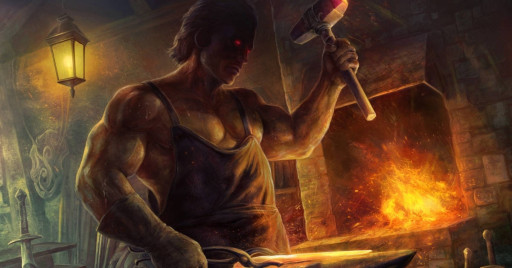
Forge yourself into something greater. Art by Jason A. Engle.
Source: Tasha's Cauldron of Everything
- You have honed your proficiency with particular skills, granting you the following benefits:
- Increase one ability score of your choice by 1, to a maximum of 20.
- You gain proficiency in one skill of your choice.
- Choose one skill in which you have proficiency. You gain expertise with that skill, which means your proficiency bonus is doubled for any ability check you make with it. The skill you choose must be one that isn't already benefiting from a feature, such as Expertise, that doubles your proficiency bonus.
Skill Expert, like Lucky (number 3, below), is a feat that works great for almost every class and character. It’s smack in the middle of this list because it’s highly advantageous, but not quite as applicable to cleric-specific roles as the other feats listed here.
Like Fey Touched, Skill Expert gives you an ability score increase. As before, you’ll want to use this to beef up your Wisdom. This will give many bonuses to your spellcasting, and spells are fundamental to being a cleric.
Additionally, you gain proficiency in one skill of your choice. Use this to round out your party, if there’s something you’re consistently bad at as a group. Or, boost a skill you tend to fail, or one you simply wish you had but don’t yet.
You also get expertise, which can be super helpful! For example, if you’re rolling with disadvantage on stealth checks due to your heavy armor, getting proficiency in stealth will cancel out that penalty. Add expertise, and suddenly you’re one of the sneakiest in the party, without even being a rogue!
Or maybe you just really want to get better with animals. No judgment here! Use these bonuses how you like, and feel the benefits every time your DM asks you to make that check.
Why Skill Expert Is Great For Cleric
- Better Spellcasting: Enhance your wisdom, and every aspect of your spellcasting improves. Attack roll, saving through, healing, you name it.
- More well rounded skills: Proficiency in another skill fills in the gaps in your party or character.
- An Expert Touch: Expertise transforms one of your proficient skills into a masterful one. Use it to boost a skill only you have, or one you desperately need to get better at.
4. Bountiful Luck

The universe provides. Art by Milivoj Ceran.
Source: Xanathar's Guide to Everything
- Prerequisite: Halfling
- Your people have extraordinary luck, which you have learned to mystically lend to your companions whenever you see them falter. You're not sure how you do it, you just wish it, and it happens. Surely a sign of fortune's favor!
- When an ally you can see within 30 feet of you rolls a 1 on the d20 for an attack roll, an ability check, or a saving throw, you can use your reaction to let the ally reroll the die. The ally must use the new roll.
- When you use this ability, you can't use your Lucky racial trait before the end of your next turn
Bountiful Luck is the ultimate party-saving feat. Any player with at least one session under their belt knows that a nat 1 means certain doom. And even when it doesn’t, it feels terrible to roll!
It’s the dice equivalent of slipping on a banana peel while in hot pursuit. All the momentum stops, and you’ll hear a collective “awww” from the table, and the slaps of palms on faces.
But then, you stand up and point at your failing friend: “Re-roll that die!” you shout. And the table lights up again as your friend gets a second chance at persuading the guard to let you go free just this once!
Why Bountiful Luck Is Great For Cleric
- Hero of the Table: You get to transform your teammates’ worst failures! At worst, they’ll fail but not spectacularly. Better yet, they’ll succeed. And even better still, they’ll roll another Nat 1, and everyone can laugh and admit they’re destined to fail!
- Nat 1s happen more than you’d think: 5% of the time may seem like a little, but that’s 1 out of every 20 rolls. Even relatively low-rolling DMs can easily call for 20 rolls in a session.
- Finally get to use your reaction: As a cleric, you’ll rarely be using your reaction. This means that not only do you now have a good use for it, but it will most likely be available when it’s needed!
3. Lucky
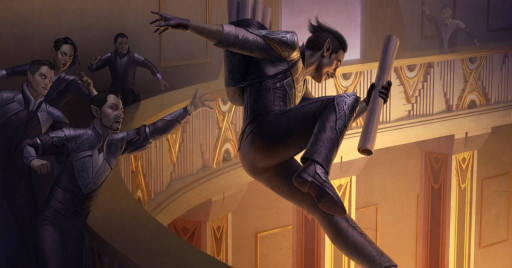
You just always seem to get away. Art by Steve Argyle.
Source: Player's Handbook
- You have inexplicable luck that seems to kick in at just the right moment.
- You have 3 luck points. Whenever you make an attack roll, an ability check, or a saving throw, you can spend one luck point to roll an additional d20. You can choose to spend one of your luck points after you roll the die, but before the outcome is determined. You choose which of the d20s is used for the attack roll, ability check, or saving throw.
- You can also spend one luck point when an attack roll is made against you. Roll a d20 and then choose whether the attack uses the attacker's roll or yours.
- If more than one creature spends a luck point to influence the outcome of a roll, the points cancel each other out; no additional dice are rolled.
- You regain your expended luck points when you finish a long rest.
Lucky is an amazing feat. With the d20 roll being the foundation of the entire game, the ability to re-roll dice when you don’t like the result is super powerful.
There are a couple extra things that make this feat amazing. While you don’t get to re-roll once you know the outcome, you *do* get to choose which dice to use. Contrast this with Bountiful Luck (above, number 4), where your ally must use the new roll.
In other words, if you re-roll and it’s worse, you can use the better one! This is especially useful since you don’t know the result of the dice - you’re essentially giving yourself advantage (or disadvantage, if you really want it)! Take that, DM who wants to punish me for being clever!
(PSA - if your DM actually wants to punish you, have a conversation with them out of game. That’s probably unhealthy, and a good old-fashioned heart-to-heart is in order).
Also, you can affect attacks made against you! And again, *you* get to decide which result to take. So grin mischievously as your opponent keeps missing you, even when they’re sure you’re trapped.
Why Lucky Is Great For Cleric:
- Increased odds of success: Clerics make a lot of rolls in their pursuit of party aid. Getting advantage on these attempts makes you much more effective, and your party will thank you for it.
- The non-illusion of choice: it’s up to you which roll to take! So take the one that best fits what you’re aiming to do.
- Be untouchable: Want to get across the map without taking damage? Want to wade into a horde of enemies to save your friend, but not go down with them? Want to get away from the annoying kobold who keeps swinging for your ankles? Just be Lucky!
2. War Caster
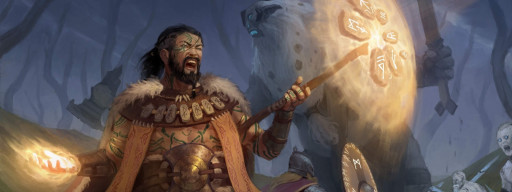
Spells in battle just got so much better. Art by Manuel Castañón.
Source: Player's Handbook
- Prerequisite: The ability to cast at least one spell
- You have practiced casting spells in the midst of combat, learning techniques that grant you the following benefits:
- You have advantage on Constitution saving throws that you make to maintain your concentration on a spell when you take damage.
- You can perform the somatic components of spells even when you have weapons or a shield in one or both hands.
- When a hostile creature's movement provokes an opportunity attack from you, you can use your reaction to cast a spell at the creature, rather than making an opportunity attack. The spell must have a casting time of 1 action and must target only that creature.
Oh, War Caster. This was the first feat I ever took in my first campaign as a Cleric, and it served me well for the next three years of gameplay. If there is one feat I recommend to any cleric, it’s War Caster.
You might ask me: “JL, why is this not your number one pick then?” Because Metamagic Adept is just so freaking good. But we’ll get to that in a minute.
I recommend War Caster because it reduces your worry. The life of a cleric is full of concern! You’re doing so much for your party, even when they’re off getting themselves in trouble (despite your many warnings!).
War Caster helps ease this worry in two ways. First, you don’t have to think so hard about what you’re holding. You can have your trusty mace in one hand, your sturdy shield in the other, and you can still cast any spell that uses your hands! This frees up your mental energy to spend saving your friends, without dropping the cookies you just bought.
Second, War Caster gives you advantage on the saving throws you make to maintain concentration on a spell. Many cleric spells use concentration, and a lot of the ways you’ll be assisting your team will be based on these spells. If you take damage while holding a spell with concentration, you have to roll to see if the spell stays up.
Getting advantage on this roll is crucial! It can be the difference between your party getting away from an overwhelming enemy, or getting trapped and having to face a player death. Or it can be the thing that keeps your teammates dealing damage, even when you’re also taking it.
Why War Caster Is Great For Cleric
- Think about the important things: You (the player) don’t have to worry about if you *can* cast the spell. Instead, think about *which* spell to cast, and on who.
- Keep your assistance up for longer: Advantage on the rolls you make to keep your spells up! Need I say more??
- Better Opportunity Attacks: We clerics aren’t big on weapon attacks (most of the time - cough cough War Domain cough). With war caster we can forget about those measly 1d6+STR mace attacks. Hit the fleeing enemy with a lovely 3d10 Inflict Wounds instead!
1. Metamagic Adept

Magic that affects magic - whoa. Art by Kieran Yanner.
Source: Tasha's Cauldron of Everything
- Prerequisite: Spellcasting or Pact Magic feature
- You've learned how to exert your will on your spells to alter how they function:
- You learn two Metamagic options of your choice from the sorcerer class. You can use only one Metamagic option on a spell when you cast it, unless the option says otherwise. Whenever you reach a level that grants the Ability Score Improvement feature, you can replace one of these Metamagic options with another one from the sorcerer class.
- You gain 2 sorcery points to spend on Metamagic (these points are added to any sorcery points you have from another source but can be used only on Metamagic). You regain all spent sorcery points when you finish a long rest.
Okay. This is seriously the BEST feat for clerics. I’m not joking when I say this feat utterly transforms the way you’ll operate.
Let’s reflect for a moment. As a Cleric, you’re running party support. Yes, even in the offensive domains like Death and Light- you’ll still have the base cleric spells and features. Chances are you’ll still be Bless-ing and Guidance-ing your way around the party.
Even if you’re less support focused, you’re still a spellcaster. You’re still pretty spell dependent!
So, what is the biggest limit on achieving your clerical (yes I know that’s not what that word normally means bear with me) goals? The *literal restrictions on the spells*. I’m talking range, casting time, duration, damage rolls, number of targets, you name it!
Metamagic lets you manipulate and surpass these restrictions with ease! Missed the spell attack roll? Seeking spell - try again. Need more time with the spell up? Extended spell - double the duration. Need to send the spell farther? Distant spell - double the distance.
With only two sorcery points, there are a couple options off the table. Heightened spell, which makes your target roll the save with disadvantage, requires three. Also, combining metamagic options is limited to the 1-point-cost-ers.
The only other downside is that you only get two options. This means you need to pick carefully, and think about which kinds of assists you’ll need most often. But you do get to switch out which metamagic options you’re using every once in a while, so it’s not the end of the world if you get it wrong.
This is still an incredible ability! I mean, you’re stealing the sorcerer’s core function and adding it to *practically everything you do*. Even the less useful options are AMAZING!
This feat truly elevates the Cleric into something more. A Clerocerer. A Sleric? No, these are terrible names, and I am sorry. But you get what I mean. You’re no longer a Cleric. You’re…incredible.
Why Metamagic Adept Is Great For Cleric
- Double your spell range: Healing word your downed ally from 120 feet away! Zap a foe with Guiding Bolt from 240 feet!? I dare you to find me a battle map bigger than 240 feet across.
- Double targets: Oh no, two party members are down! Who to revive? BOTH OF THEM! Ah, your wizard is surrounded by enemies! If only you could give more than one of them Blindness, to give you a better chance of survival! NOW YOU CAN!
- It doesn’t matter what you pick: Seriously, pick any metamagic option, and you’re gonna benefit! This feat is truly next level.

